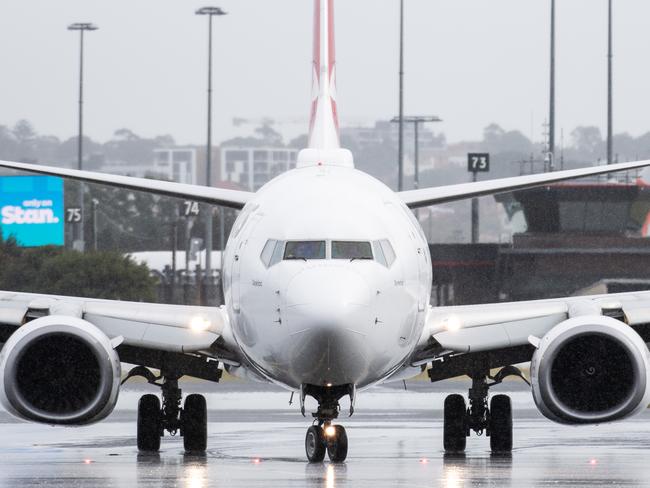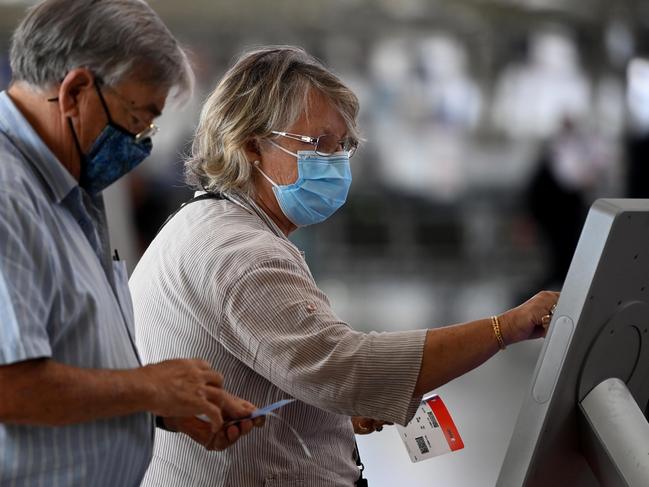India travel ban challenge suffers court blow, but potential constitutional clash to come
A judge has ruled on the first two arguments made by a Melbourne man stranded in India who is trying to overturn the controversial travel ban.
NewsWire
Don't miss out on the headlines from NewsWire. Followed categories will be added to My News.
The legal challenge to the government’s controversial India travel ban has suffered a blow as a judge threw out arguments accusing Health Minister Greg Hunt of incorrectly wielding his emergency powers.
But there may be a constitutional argument to come ahead of the ban being lifted on Friday.
The emergency determination making it unlawful for citizens and non-citizens alike to enter Australia if they had been to India in the 14 days prior came into force last Monday.
It is being challenged in the Federal Court by Melbourne man Gary Newman, who flew to India in March 2020 to visit friends and is now stranded there as the South Asian nation bends under the weight of a deadly COVID outbreak.
The dual Australian and UK citizen is in Bangalore and, at age 73, is in a “vulnerable demographic”, his lawyer Christopher Ward SC told the court on Monday.

He initially intended to stay the term of his 180-day visa but his plans were stymied by the pandemic.
A return flight he booked in November 2020 was cancelled, the court heard, and he wants to come home “as soon as possible”.
An affidavit filed by his solicitor Michael Bradley on May 5 states: “(He) has not left his residence in the past 12 days as he is fearful of contracting COVID-19 and suffering severe illness.”
The first two of Mr Newman’s four arguments against the ban, alleging Mr Hunt had improperly used his powers under the Biosecurity Act, were thrown out by Justice Thomas Thawley on Monday.
Dr Ward told the court the ban was the “most intrusive and restrictive method” of controlling COVID-19 possible.
He argued Mr Hunt had failed to consider if the ban on direct flights from India, enacted just days earlier, could have worked as a much less restrictive means of achieving the same outcome.
He said the minister must have had evidence of a “real and serious risk” to Australia’s quarantine system presented by people transiting through third states from India to Australia in order for “a decision of this magnitude, this sensitivity, this extraordinary infringement on a fundamental right to be valid”.
“Of which there is not a skerrick of evidence. Not a jot,” Dr Ward said.

But the argument was rejected by Justice Thomas Thawley, who found Mr Hunt had considered if the next step of banning all travellers was necessary as the minister had read a letter from chief medical officer Paul Kelly dated April 30 that referenced the flight ban.
“It is tolerably clear that the chief medical officer thought further relief would come to Australia’s quarantine endeavour by preventing further entry, even for those travelling indirectly through transit hubs,” the judge said.
Dr Ward also said Mr Hunt had failed to consider the potential knock-on effect of COVID-19 spreading in prisons if flouters of the ban were jailed.
But Justice Thawley described the hypothetical as a “strange situation” and ruled Mr Hunt did not have to consider it.
Dr Ward also argued the Biosecurity Act did not, in clear terms, grant Mr Hunt the power to override the fundamental right of citizens to return home.
“In our submission, section 477.1 grants the minister undoubtedly broad, sweeping powers to respond to biosecurity emergencies,” he said.
“But it does not grant the minister broad sweeping powers to abrogate fundamental common law rights.”
Craig Lenehan SC contended it did, saying a “bulldozer” effect gave the Commonwealth broad powers.
Here, too, Justice Thawley found in favour of the Commonwealth, saying the power was deliberately drafted broadly.
The case may now proceed to hearing Mr Newman’s third and fourth arguments, which contend respectively that the travel ban was a disproportionate response in the circumstances and that it was unconstitutional.
But, as Dr Ward acknowledged, there was a possibility it all became moot on Friday afternoon if the government repealed the ban.
Originally published as India travel ban challenge suffers court blow, but potential constitutional clash to come



